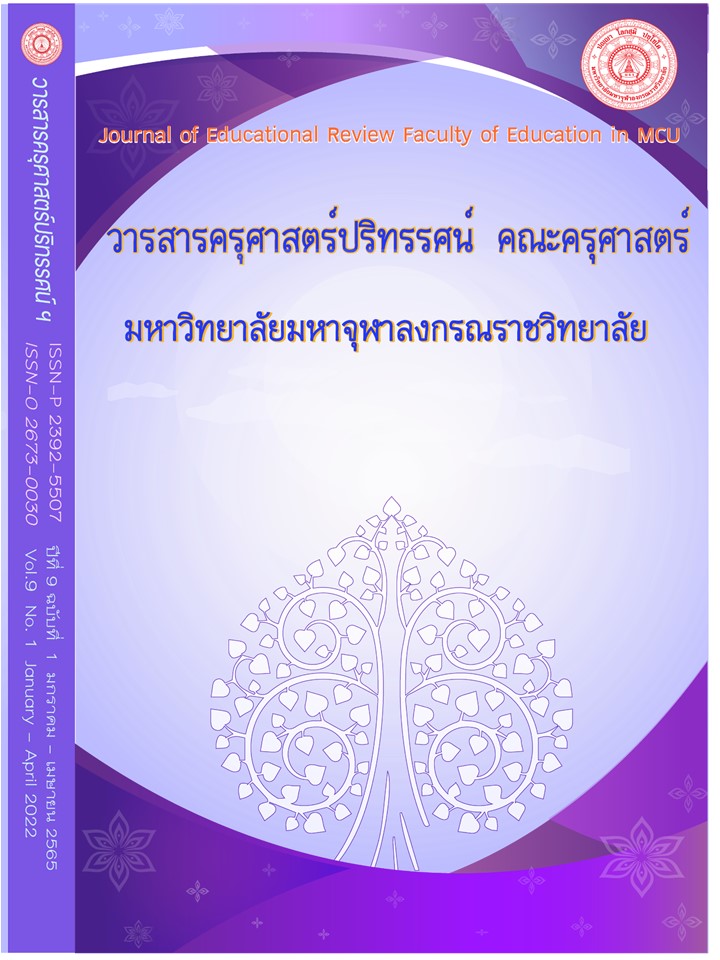TPACK TO LEARN FOR SCIENCE: TPACK TO LEARN FOR CHEMISTRY
Main Article Content
Abstract
This article presents teachers’ learning management alternatives with appropriate content, pedagogy, and technology selection are the reasons of this research. The objectives were to develop and evaluate teaching scenarios in form of TPACK in chemistry for lower secondary level. The research methodology was to define chemistry concepts and develop TPACK learning guidelines. These data developed were required exactness and appropriateness by sample expert participants; consisted of university science teachers, chemistry experts from The Institute for the Promotion of Teaching Science and Technology, and educational supervisors. The research tool was a questionnaire about teaching scenario assessment. Data were analyzed by descriptive statistics and content analysis. The research findings are as follows 1) The chemistry learning guidelines under the concept of matter were divided into 4 sub-concepts. Each sub-concept consisted of 4 learning guidelines, a total of 16 learning guidelines. 2)Most of the experts considered that chemistry teaching scenarios were appropriate at high and the highest levels and would be increased the learning efficiency of teaching chemistry.
Article Details

This work is licensed under a Creative Commons Attribution-NonCommercial-NoDerivatives 4.0 International License.
ทัศนะและความคิดเห็นที่ปรากฏในบทความในวารสารฉบับนี้ถือเป็นความรับผิดชอบของผู้เขียนบทความนั้นเพียงผู้เดียว และไม่ถือเป็นทัศนะและความรับผิดชอบของกองบรรณาธิการ
กองบรรณาธิการขอสงวนสิทธิ์ในการคัดเลือกบทความลงตีพิมพ์และจะแจ้งให้เจ้าของบทความทราบหลังจากผู้ประเมินบทความตรวจอ่านบทความแล้ว
ต้นฉบับที่ได้รับการตีพิมพ์ในวารสารครุศาสตร์ปริทรรศน์ คณะครุศาสตร์ มหาวิทยาลัยมหาจุฬาลงกรณราชวิทยาลัย ถือเป็นกรรมสิทธิ์ของคณะครุศาสตร์ มหาวิทยาลัยมหาจุฬาลงกรณราชวิทยาลัย ห้ามนำข้อความทั้งหมดหรือบางส่วนไปพิมพ์ซ้ำ เว้นเสียแต่ว่าจะได้รับอนุญาตจากมหาวิทยาลัยฯ เป็นลายลักษณ์อักษร
References
กนกวรรณ แปงใจ. (2555). การพัฒนาแนวคิดและความสามารถในการสืบเสาะหาความรู้ทางวิทยาศาสตร์ ของนักเรียนระดับชั้นประถมศึกษาปีที่ 6 หน่วยการเรียนรู้เรื่อง ธรณีพิบัติภัย โดยการจัดกิจกรรมโครงงานวิทยาศาสตร์. วิทยานิพนธ์ศึกษาศาสตรมหาบัณฑิต. มหาวิทยาลัยเกษตรศาสตร์.
กระทรวงศึกษาธิการ. (2551). หลักสูตรแกนกลางการศึกษาขั้นพื้นฐาน พุทธศักราช 2551. กรุงเทพมหานคร: คุรุสภาลาดพร้าว.
กฤษณา ชุติมา. (2556). หลักเคมีทั่วไป เล่ม 1. พิมพ์ครั้งที่ 15. กรุงเทพมหานคร: จุฬาลงกรณ์มหาวิทยาลัย.
เจนศึก โพธศาสตร์. (2555). บทบาทผู้สอนตามระบบการศึกษาในปัจจุบัน. วารสารพัฒนาการเรียนการสอนมหาวิทยาลัยรังสิต. 6(20). 97-108.
ฉัตรชัย มณีนาค. (2553). เทคโนโลยีเพื่อการปฏิรูปการศึกษาโดยเน้นผู้เรียนเป็นสำคัญ. แหล่งที่มา http://www.school.net.th/library/create-web/10000/generality/10000-8890.html. สืบค้นเมื่อ 1 ธ.ค. 2561.
ทิศนา แขมมณี. (2545). ศาสตร์การสอน. พิมพ์ครั้งที่ 2. กรุงเทพมหานคร: จุฬาลงกรณ์มหาวิทยาลัย.
วีระพงษ์ แสงชูโต. (2532). การเปรียบเทียบผลสัมฤทธิ์ในการสอนซ่อมเสริมวิชาเคมี โดยใช้คอมพิวเตอร์ช่วยสอนกับการสอนปกติ. วิทยานิพนธ์ศิลปศาสตรมหาบัณฑิต. มหาวิทยาลัยเกษตรศาสตร์.
สถาบันส่งเสริมการสอนวิทยาศาสตร์และเทคโนโลยี. (2556). ทักษะกระบวนการทางวิทยาศาสตร์. กรุงเทพมหานคร: อมรินทร์พริ้นติ้งกรุ๊ฟ.
Archambault, L. M., and J. H. Barnett. (2010). Revisiting technological pedagogical content knowledge: Exploring the TPACK framework. Computers & Education. Arizona State University.
Koehler, M. J., Mishra, P., & Yahya, K. (2007). Tracing the development of teacher knowledge in a design seminar: Integrating content, pedagogy and technology. Computers & Education. Michigan State University. United States.
Mishra and Koehler. (2006).Technological Pedagogical Content Knowledge: A Framework for Teacher Teachers College. Columbia University. Michigan USA.
Shulman, L. S. (1987). Those who understand: Knowledge growth in teaching, Stanford University. California USA.


